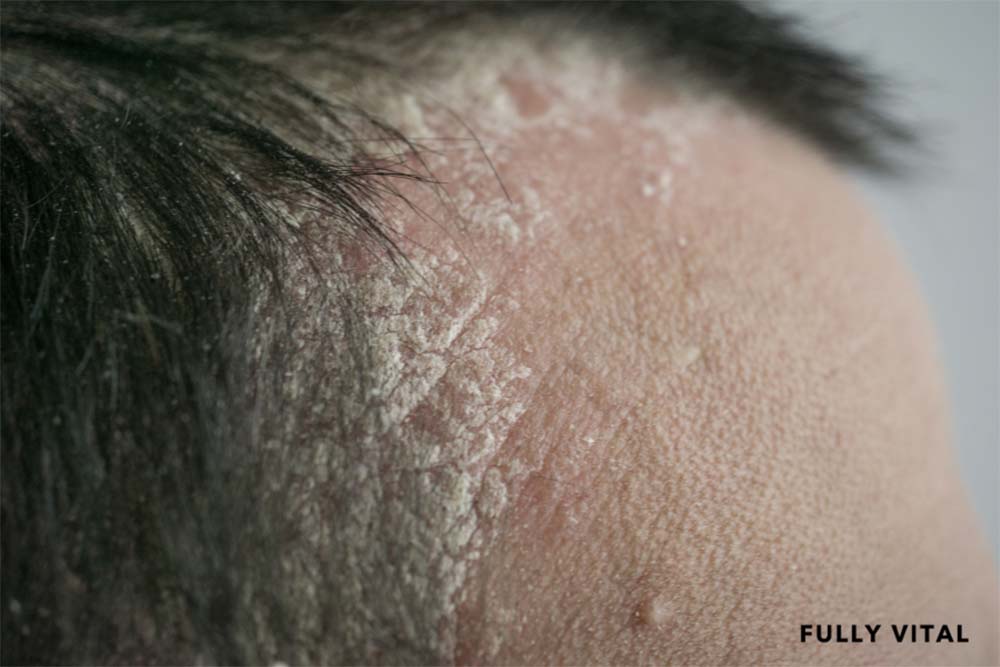
Understanding Pityriasis Amiantacea: A Comprehensive Guide For Hair Growth Enthusiasts
In our quest to provide valuable insights to women of all hair types seeking effective hair growth solutions, we delve into a lesser-known yet significant hair condition – pityriasis amiantacea. In this article, we'll explore what pityriasis amiantacea is, why it's crucial to understand it, how it occurs, the benefits of addressing it, potential downsides to treatment, and alternative approaches. Let's embark on this journey to unravel the mysteries of pityriasis amiantacea.

I LOVE MY HAIR NOW
FullyVital hair serum and hair vitamins made tremendous improvements in my hair. I truly love my hair now.
Dorit S.,
What Is Pityriasis Amiantacea?
Pityriasis amiantacea, often abbreviated as PA, is a rare scalp condition characterized by the excessive buildup of thick, silver-white scales on the scalp. These scales adhere closely to the hair shafts, creating a hardened, asbestos-like appearance, hence the term "amiantacea." It can affect individuals of any age, gender, or hair type, making it essential for everyone to be aware of its existence.

Why Is Understanding Pityriasis Amiantacea Important?
Understanding pityriasis amiantacea is essential for several reasons:
Early Detection
Recognizing the condition is the first step towards addressing it. Early detection can prevent further complications.
Hair Health
PA can lead to hair loss and scalp inflammation. By understanding it, you can take steps to maintain the health of your hair and scalp.1
Treatment
Knowledge of PA helps you explore treatment options and make informed decisions to manage the condition effectively.
Confidence
Dealing with scalp issues can impact one's confidence. Understanding PA can alleviate concerns and empower individuals to seek solutions.
How Does Pityriasis Amiantacea Occur?
The exact cause of pityriasis amiantacea is not fully understood, but it is often associated with underlying skin conditions such as psoriasis, seborrheic dermatitis, or fungal infections. Here's how it typically occurs:
- Excessive Scalp Scaling: Individuals with PA experience an abnormal increase in scalp scaling, leading to the formation of thick, adherent scales.
- Inflammation: The condition is often accompanied by scalp inflammation, which can be itchy and uncomfortable.
- Hair Involvement: PA scales cling to the hair shafts, causing them to become entangled and matted.
What Are The Benefits Of Addressing Pityriasis Amiantacea?
Addressing pityriasis amiantacea offers several benefits:
- Hair Regrowth: Treating PA can promote hair regrowth, helping individuals regain their lush locks.2
- Improved Scalp Health: Treatment alleviates scalp inflammation, reducing discomfort and itchiness.
- Enhanced Confidence: Managing PA can boost self-confidence by eliminating the unsightly scales and hair issues associated with the condition.
- Prevention of Complications: Addressing PA early can prevent complications like secondary infections or further hair loss.
Are There Any Downsides To Pityriasis Amiantacea Treatment?
While treating pityriasis amiantacea is generally beneficial, there can be some downsides:
- Time-Consuming: Treatment may require ongoing care and patience to see significant results.
- Cost: Depending on the chosen treatment, costs can add up over time.
- Possible Side Effects: Some treatments may have mild side effects, although they are usually temporary.
What Are The Alternatives To Pityriasis Amiantacea Treatment?
If you're exploring alternatives to traditional treatment methods, consider the following:
- Natural Remedies: Some individuals opt for natural remedies like coconut oil or aloe vera to soothe the scalp and reduce scaling.
- Medicated Shampoos: Specialized medicated shampoos can help manage the condition, but their efficacy varies.
- Consult a Dermatologist: For severe cases, consulting a dermatologist is recommended. They can prescribe tailored treatments such as topical steroids or antifungal medications.
What Is The Most Common Cause Of Pityriasis Amiantacea?
Pityriasis amiantacea (PA) is most commonly associated with underlying skin conditions, such as:
Psoriasis
PA can be a manifestation of scalp psoriasis, where the immune system triggers excessive skin cell growth on the scalp, leading to scaling and flaking.
Seborrheic Dermatitis
This chronic skin condition causes red, scaly patches and can also affect the scalp, contributing to PA.
Fungal Infections
Fungal overgrowth on the scalp, like tinea capitis, can lead to PA, especially in children.
Allergic Reactions
In some cases, an allergic reaction to hair products or chemicals can trigger PA.
Can Pityriasis Amiantacea Cause Hair Loss?
Yes, pityriasis amiantacea can indeed cause hair loss. This scalp condition is characterized by the excessive buildup of thick, adherent scales on the scalp, which not only create an unsightly appearance but also lead to several issues affecting hair health.
The scaling and inflammation associated with pityriasis amiantacea can damage hair follicles and interfere with the normal hair growth cycle. As a result, affected individuals may experience hair thinning or even noticeable hair loss in the affected areas. It's crucial to address pityriasis amiantacea promptly through medical treatment and lifestyle adjustments to minimize the risk of hair loss and promote scalp and hair health. Consulting a dermatologist for a personalized treatment plan is advisable for those dealing with this condition.
Is Pityriasis Amiantacea Permanent?
Pityriasis amiantacea is not necessarily permanent. While it can be a chronic condition, its permanence depends on how it's managed and treated. With appropriate medical care and lifestyle adjustments, many individuals experience significant improvements and even full resolution of their pityriasis amiantacea symptoms.3 Early intervention is crucial to prevent long-term complications, such as permanent hair loss or scarring. Therefore, it's essential for individuals dealing with pityriasis amiantacea to seek prompt diagnosis and follow a recommended treatment plan to maximize their chances of a favorable outcome.
Is Pityriasis Amiantacea Curable?
While pityriasis amiantacea may not always be curable in the strictest sense, it is highly manageable. With the right approach, including medical treatment and lifestyle adjustments, individuals can effectively control the condition and reduce its impact on their hair and scalp. Regular monitoring and adherence to treatment recommendations are key to successful management.
How Do You Treat Pityriasis Amiantacea?
The treatment of pityriasis amiantacea typically involves a combination of medical interventions and lifestyle adjustments:
Medical Treatments
- Topical Steroids: Dermatologists often prescribe topical corticosteroids to reduce inflammation and scaling.
- Antifungal Medications: If a fungal infection is suspected, antifungal medications may be prescribed to target the underlying cause.
- Salicylic Acid Shampoos: Shampoos containing salicylic acid can help soften and remove scales from the scalp.
- Tar-based Shampoos: Tar-based shampoos can reduce scaling and inflammation, promoting a healthier scalp.
Lifestyle Adjustments
- Gentle Scalp Care: Avoid vigorous scratching or harsh brushing, as these can worsen the condition.
- Avoid Irritants: Choose mild hair products and avoid hair treatments that may exacerbate PA.
- Stress Management: Stress can trigger or worsen scalp conditions, so stress reduction techniques can be beneficial.
- Maintain Good Hygiene: Regular washing and gentle cleansing of the scalp can help manage PA.
- Consult a Dermatologist: Always consult a dermatologist for a personalized treatment plan tailored to your specific condition and needs.
Unlock The Secret To Youthful Hair With Fully VitalDiscover the power of science-backed hair growth solutions from Fully Vital. Our products are meticulously crafted to:
Join us in the journey to healthier, age-defying hair. Explore our range today and embrace the beauty of revitalized locks! |
Final Thoughts On Pityriasis Amiantacea
Understanding and addressing pityriasis amiantacea is not just about managing a scalp condition; it's about nurturing a healthier, more vibrant relationship with your hair. As we've explored the history, current landscape, and future possibilities of pityriasis amiantacea, it's clear that this topic holds immense importance for those on a hair growth journey.
At Fully Vital, we are dedicated to supporting your quest for beautiful, age-defying locks. Our range of hair growth products is designed to help you overcome challenges like pityriasis amiantacea, ensuring that your hair remains a source of confidence and beauty.
Whether you're seeking prevention or treatment, our products are formulated to nurture your hair's vitality. Embrace your hair growth journey with the assurance that you can overcome scalp concerns and enjoy the radiant hair you deserve.
Explore our hair growth solutions, and take the first step toward a healthier, more vibrant relationship with your locks. Your hair's future begins with Fully Vital.
Frequently Asked Questions About Pityriasis Amiantacea
Does pityriasis amiantacea cause permanent hair loss?
In most cases, pityriasis amiantacea does not cause permanent hair loss. Hair growth usually resumes once the condition is treated.
Is pityriasis amiantacea contagious?
No, pityriasis amiantacea is not contagious. It is a scalp condition associated with skin disorders, such as psoriasis and seborrheic dermatitis. Unlike contagious conditions, it does not spread from person to person through direct contact. Understanding this fact can alleviate concerns about transmitting the condition to others.
Can I use over-the-counter shampoos to treat pityriasis amiantacea?
While over-the-counter shampoos may provide relief for mild cases of pityriasis amiantacea, it's essential to consult a dermatologist for a proper diagnosis and treatment plan. In some instances, specialized medicated shampoos or prescription medications may be necessary to effectively address this condition. Over-the-counter products may not be potent enough to manage the excessive scaling and inflammation associated with pityriasis amiantacea.
Are there any dietary recommendations for managing pityriasis amiantacea?
While a balanced diet is essential for overall health, specific dietary recommendations for pityriasis amiantacea are limited. Focus on maintaining a healthy lifestyle to support your hair and scalp.
Can stress worsen pityriasis amiantacea?
Stress may exacerbate some skin conditions, including pityriasis amiantacea. Stress management techniques, such as meditation or yoga, may be beneficial.
How long does it take to see improvements with treatment?
The timeline for improvement varies from person to person. Some individuals may experience relief within a few weeks of treatment, while others may require several months of consistent care. It's essential to follow your dermatologist's guidance and be patient during the healing process.
Is it necessary to continue treatment after symptoms improve?
Yes, it is often necessary to continue treatment even after symptoms improve to prevent the recurrence of pityriasis amiantacea. Your dermatologist will provide guidance on the duration of treatment and any necessary maintenance.
Are there any lifestyle changes that can help manage pityriasis amiantacea?
Maintaining a healthy lifestyle can support the management of pityriasis amiantacea. This includes proper scalp hygiene, stress reduction, and avoiding harsh hair care products that may exacerbate symptoms. Consult with your dermatologist for personalized recommendations.
Can I dye or style my hair while undergoing treatment?
It's best to consult your dermatologist before using hair dyes or styling products while undergoing treatment for pityriasis amiantacea. Some products may irritate the scalp, so your dermatologist can provide guidance on safe options.
Are there any specific precautions to take during treatment?
During treatment, avoid scratching the scalp, as this can worsen symptoms. Be consistent with your prescribed treatments and follow your dermatologist's instructions closely. If you experience any unexpected side effects, contact your healthcare provider promptly.
Sources:
- Diaz-Perez, J. A., Joyce, J. C., Cibull, T., & Victor, T. A. (2018). Development of pityriasis amiantacea after valproic acid therapy. International Journal of Trichology, 10(5), 237–237. https://doi.org/10.4103/ijt.ijt_53_18
- Wu, A. G., Barilla, S., & Madan, R. K. (2022). Manifestation of pityriasis amiantacea following initiation of minoxidil. JAAD Case Reports, 24, 94–96. https://doi.org/10.1016/j.jdcr.2022.04.002
- Amorim, G. M., & Fernandes, N. C. (2016). Pityriasis amiantacea: a study of seven cases. Anais Brasileiros de Dermatologia, 91(5), 694–696. https://doi.org/10.1590/abd1806-4841.20164951







